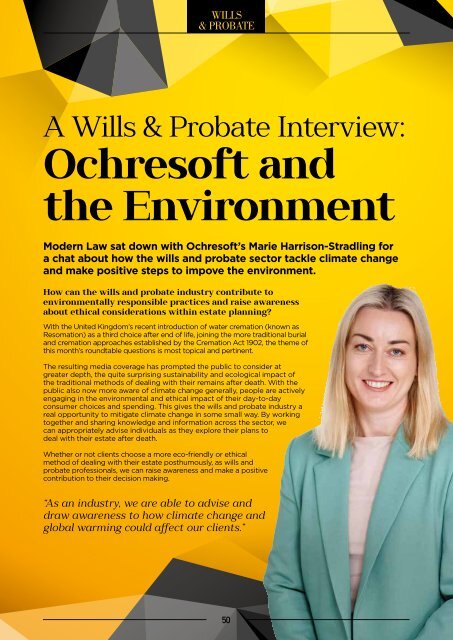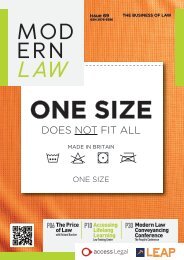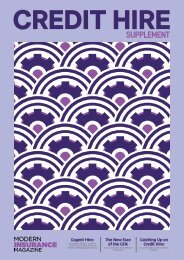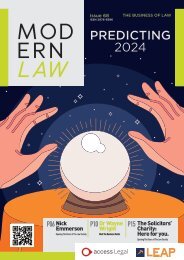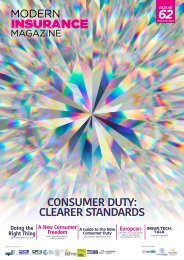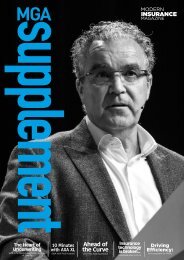Modern Law Magazine Issue 67
You also want an ePaper? Increase the reach of your titles
YUMPU automatically turns print PDFs into web optimized ePapers that Google loves.
WILLS<br />
& PROBATE<br />
WILLS<br />
& PROBATE<br />
A Wills & Probate Interview:<br />
Ochresoft and<br />
the Environment<br />
<strong>Modern</strong> <strong>Law</strong> sat down with Ochresoft’s Marie Harrison-Stradling for<br />
a chat about how the wills and probate sector tackle climate change<br />
and make positive steps to impove the environment.<br />
How can the wills and probate industry contribute to<br />
environmentally responsible practices and raise awareness<br />
about ethical considerations within estate planning?<br />
With the United Kingdom’s recent introduction of water cremation (known as<br />
Resomation) as a third choice after end of life, joining the more traditional burial<br />
and cremation approaches established by the Cremation Act 1902, the theme of<br />
this month’s roundtable questions is most topical and pertinent.<br />
The resulting media coverage has prompted the public to consider at<br />
greater depth, the quite surprising sustainability and ecological impact of<br />
the traditional methods of dealing with their remains after death. With the<br />
public also now more aware of climate change generally, people are actively<br />
engaging in the environmental and ethical impact of their day-to-day<br />
consumer choices and spending. This gives the wills and probate industry a<br />
real opportunity to mitigate climate change in some small way. By working<br />
together and sharing knowledge and information across the sector, we<br />
can appropriately advise individuals as they explore their plans to<br />
deal with their estate after death.<br />
Whether or not clients choose a more eco-friendly or ethical<br />
method of dealing with their estate posthumously, as wills and<br />
probate professionals, we can raise awareness and make a positive<br />
contribution to their decision making.<br />
“As an industry, we are able to advise and<br />
draw awareness to how climate change and<br />
global warming could affect our clients.”<br />
“Climate change and global<br />
warming will impact thewills<br />
and probate sector as much as it<br />
will across all areas of business<br />
and commerce.”<br />
What potential issues might arise in<br />
the wills and probate sector due to the<br />
impact of global warming.<br />
Climate change and global warming will impact the<br />
wills and probate sector as much as it will across<br />
all areas of business and commerce – and societies<br />
globally. Climate change knowledge and awareness<br />
will need to be a primary consideration for all<br />
parties in estate planning and distribution, from the<br />
general consumer to the legal practitioner to the<br />
personal representative and/or trustees involved in<br />
an estate.<br />
As an industry, we are able to advise and draw<br />
awareness to how climate change and global<br />
warming could affect our clients in their planning.<br />
• Certain client asset types might face increased<br />
risk and be more vulnerable to environmental<br />
change, due to their nature and/or location.<br />
• Other asset types at greater risk of natural<br />
disasters and environmental occurrences may<br />
now need increased protective measures and<br />
suitable insurances<br />
• Climate change events and environmental<br />
opinions can swiftly and significantly affect<br />
the value of assets and investments. Legal<br />
professionals may need to review and refresh<br />
more frequently the planning advice for estates<br />
comprising agricultural and/or commercial assets.<br />
“As wills and probate<br />
professionals, we can raise<br />
awareness and make a<br />
positive contribution.”<br />
How can wills and probate practitioners<br />
promote sustainable practices in the<br />
administration of estates, including<br />
the management of real estate and<br />
investments?<br />
To successfully promote sustainable and<br />
environmentally favourable practices with our<br />
clients and the public more widely, it is in our<br />
industry’s interest to communicate clear and<br />
transparent information between organisations.<br />
Helping clients to equip themselves with and<br />
understand information about their posthumous<br />
estate options and the ethical and environmental<br />
impact of each will enable them to make<br />
informed choices.<br />
During the early stages of estate administration<br />
– as part of the initial client information discovery<br />
– practitioners should take the opportunity to<br />
prompt their new or existing clients and connected<br />
third parties to explore the sustainable and ethical<br />
practices available to them. This gives clients and<br />
connected third parties the opportunity to discuss<br />
their interest and ideas with a knowledgeable<br />
professional. At this point, and using information<br />
sheets and openly available resources,<br />
practitioners can remove myths, clarify confusions<br />
and help their clients make estate choices they are<br />
comfortable with.<br />
Unsurprisingly, immediate and future costs<br />
are usually clients’ and third parties’ primary<br />
consideration when they explore their posthumous<br />
options. That is, however, not necessarily the case;<br />
favouring sustainable practices does not cost<br />
the estate or individual as much as the public<br />
commonly expects.<br />
Whether or not clients and connected third parties<br />
select sustainable or ethical practices during<br />
the administration of an estate, by promoting<br />
the existence and accessibility of alternative<br />
options that are better for society and our planet,<br />
practitioners contribute to a brighter future.<br />
Marie Harrison-Stradling<br />
50 51


